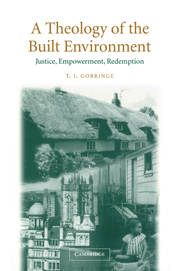Book contents
- Frontmatter
- Contents
- Preface
- 1 The theology of the built environment
- 2 Constructed space and the presence of God
- 3 The land
- 4 The human dwelling
- 5 From Eden to Jerusalem: town and country in the economy of redemption
- 6 The meaning of the city
- 7 Constructing community
- 8 But is it art?
- 9 God, nature and the built environment
- 10 Towards Jerusalem?
- Select bibliography
- Index of names
- Index of subjects
4 - The human dwelling
Published online by Cambridge University Press: 22 September 2009
- Frontmatter
- Contents
- Preface
- 1 The theology of the built environment
- 2 Constructed space and the presence of God
- 3 The land
- 4 The human dwelling
- 5 From Eden to Jerusalem: town and country in the economy of redemption
- 6 The meaning of the city
- 7 Constructing community
- 8 But is it art?
- 9 God, nature and the built environment
- 10 Towards Jerusalem?
- Select bibliography
- Index of names
- Index of subjects
Summary
Build houses and live in them; plant gardens and eat what they produce.
(Jeremiah 29.5)The house comes before the city: as the most vulnerable of mammals human beings need shelter. Even the homeless must find shelter somehow, in doorways, in cardboard cities, in subways. And from the earliest period human beings have turned raw shelter into something else, something richer, so that the built environment has become perhaps the most important lived dimension of art and culture. As Lewis Mumford reminds us, human beings were symbol making animals before they were tool making animals, and reached specialisation in myth, religion and ritual before they did in material aspects of culture. These ideological factors found expression especially in the dwelling. Amos Rapoport in particular has shown that house design cannot be understood just as a response to climate and local building potentials. These have their place, but they do not seem to be decisive. Rapoport found ‘extreme’ differences in urban pattern and house types within quite small geographical areas, which he argued showed that culture is much more decisive a factor in building than climate. His conclusion is that ‘Nonutilitarian factors seem of primary importance’ in the construction of ordinary dwellings. These include religious beliefs, family and clan structure, and social organisation. Today we are used to the idea of Feng shui and Sthapatya veda, which discern different spiritual energies in different parts of the house and claim to improve health and rest.
- Type
- Chapter
- Information
- A Theology of the Built EnvironmentJustice, Empowerment, Redemption, pp. 79 - 113Publisher: Cambridge University PressPrint publication year: 2002



